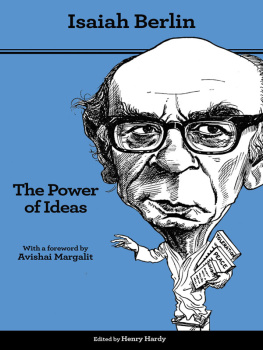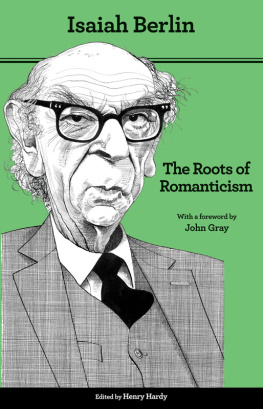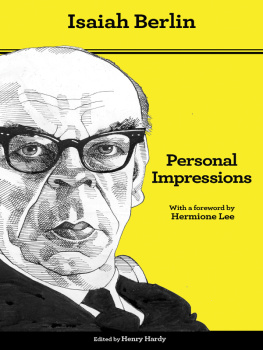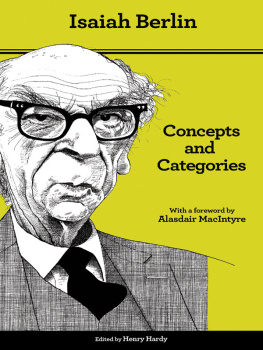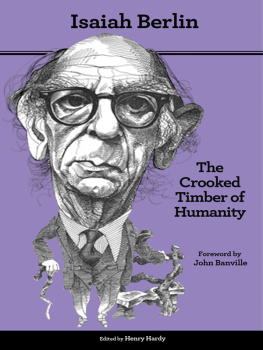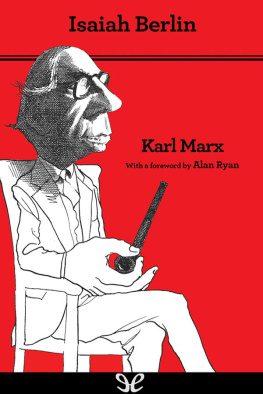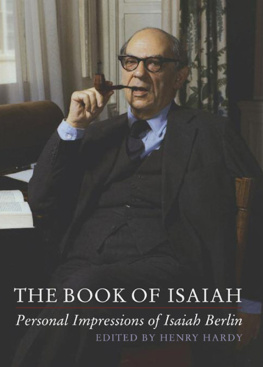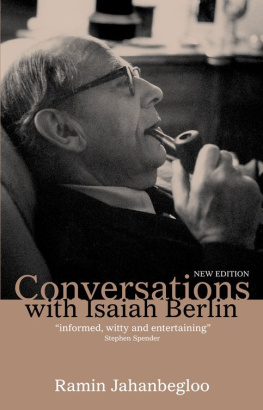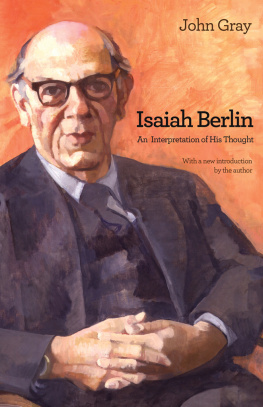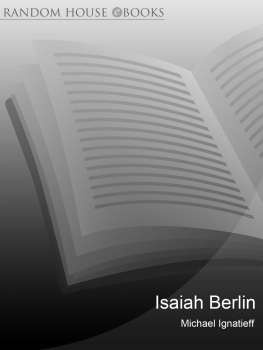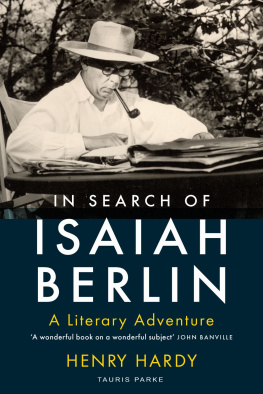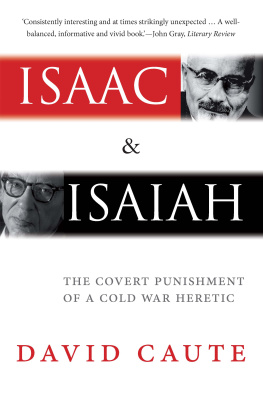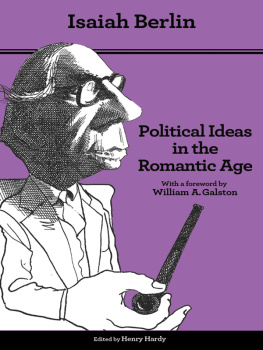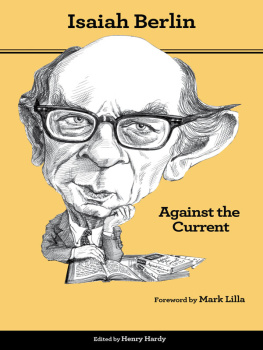Isaiah Berlin - The Power of Ideas
Here you can read online Isaiah Berlin - The Power of Ideas full text of the book (entire story) in english for free. Download pdf and epub, get meaning, cover and reviews about this ebook. year: 2013, publisher: Princeton University Press, genre: Science. Description of the work, (preface) as well as reviews are available. Best literature library LitArk.com created for fans of good reading and offers a wide selection of genres:
Romance novel
Science fiction
Adventure
Detective
Science
History
Home and family
Prose
Art
Politics
Computer
Non-fiction
Religion
Business
Children
Humor
Choose a favorite category and find really read worthwhile books. Enjoy immersion in the world of imagination, feel the emotions of the characters or learn something new for yourself, make an fascinating discovery.
- Book:The Power of Ideas
- Author:
- Publisher:Princeton University Press
- Genre:
- Year:2013
- Rating:4 / 5
- Favourites:Add to favourites
- Your mark:
- 80
- 1
- 2
- 3
- 4
- 5
The Power of Ideas: summary, description and annotation
We offer to read an annotation, description, summary or preface (depends on what the author of the book "The Power of Ideas" wrote himself). If you haven't found the necessary information about the book — write in the comments, we will try to find it.
The Power of Ideas — read online for free the complete book (whole text) full work
Below is the text of the book, divided by pages. System saving the place of the last page read, allows you to conveniently read the book "The Power of Ideas" online for free, without having to search again every time where you left off. Put a bookmark, and you can go to the page where you finished reading at any time.
Font size:
Interval:
Bookmark:

THE POWER OF IDEAS
ISAIAH BERLIN WAS BORN IN RIGA, now capital of Latvia, in 1909. When he was six, his family moved to Russia; there in 1917, in Petrograd, he witnessed both Revolutions Social Democratic and Bolshevik. In 1921 he and his parents came to England, and he was educated at St Pauls School, London, and Corpus Christi College, Oxford.
At Oxford he was a Fellow of All Souls, a Fellow of New College, Professor of Social and Political Theory, and founding President of Wolfson College. He also held the Presidency of the British Academy. In addition to The Power of Ideas, his main published works are Karl Marx, Russian Thinkers, Concepts and Categories, Against the Current, Personal Impressions, The Crooked Timber of Humanity, The Sense of Reality, The Proper Study of Mankind, The Roots of Romanticism, Three Critics of the Enlightenment, Freedom and Its Betrayal, Liberty, The Soviet Mind and Political Ideas in the Romantic Age. As an exponent of the history of ideas he was awarded the Erasmus, Lippincott and Agnelli Prizes; he also received the Jerusalem Prize for his lifelong defence of civil liberties. He died in 1997.
Henry Hardy, a Fellow of Wolfson College, Oxford, is one of Isaiah Berlins Literary Trustees. He has edited (or co-edited) many other books by Berlin, including the first three of four volumes of his letters, and is currently working on the remaining volume with Mark Pottle.
Avishai Margalit is Emeritus Professor of Philosophy at the Hebrew University of Jerusalem, and was George F. Kennan Professor at the Institute for Advanced Study, Princeton, 200611.
For further information about Isaiah Berlin visit
http://berlin.wolf.ox.ac.uk/
ALSO BY ISAIAH BERLIN
*
Karl Marx
The Hedgehog and the Fox
The Age of Enlightenment
Russian Thinkers
Concepts and Categories
Against the Current
Personal Impressions
The Crooked Timber of Humanity
The Sense of Reality
The Proper Study of Mankind
The Roots of Romanticism
Three Critics of the Enlightenment
Freedom and Its Betrayal
Liberty
The Soviet Mind
Political Ideas in the Romantic Age
with Beata Polanowska-Sygulska
Unfinished Dialogue
*
Flourishing: Letters 19281946
Enlightening: Letters 19461960
Building: Letters 19601975
THE POWER OF IDEAS

ISAIAH BERLIN
Edited by Henry Hardy
Second Edition
Foreword by Avishai Margalit
PRINCETON UNIVERSITY PRESS
PRINCETON AND OXFORD
Published in the United States of America, its Colonies and
Dependencies, the Philippine Islands, and Canada by Princeton
University Press, 41 William Street, Princeton, New Jersey 08540
Requests for permission to reproduce material from this work should be
sent to Permissions, Princeton University Press
press.princeton.edu
First published in the UK by Pimlico and in North America by
Princeton University Press 2000
Second edition published by Princeton University Press 2013
My Intellectual Path The Isaiah Berlin Literary Trust and
Henry Hardy 1998
The Search for Status The Isaiah Berlin Literary Trust 2000
Other essays copyright Isaiah Berlin 1947, 1951, 1953, 1954, 1956,
Isaiah Berlin 1960, 1962, 1966, 1968, 1969, 1972, 1975, 1978, 1979, 1995
Editorial matter Henry Hardy 2000, 2013
Foreword Princeton University Press 2013
The moral right of Isaiah Berlin and Henry Hardy to be identified as the
author and editor respectively of this work has been asserted
All Rights Reserved
Library of Congress Cataloging-in-Publication Data
Berlin, Isaiah, 19091997.
The power of ideas / Isaiah Berlin ; edited by Henry Hardy ;
foreword by Avishai Margalit. Second Edition.
pages cm
Includes bibliographical references and index.
ISBN-13: 978-0-691-15760-3 (pbk. : alk. paper)
ISBN-10: 0-691-15760-X (pbk. : alk. paper) 1. Philosophy.
I. Hardy, Henry. II. Title.
B1618.B451H467 2013
100dc23
2013019783
British Library Cataloging-in-Publication Data is available
This book has been composed in Garamond Premier Pro
Printed on acid-free paper 
Printed in the United States of America
1 3 5 7 9 10 8 6 4 2
For Wolfson College, Oxford
NOTE ON REFERENCES
REFERENCES TO THE TEXT of the present volume are given by page number alone, to notes in the form 12/3 i.e. p. 12, note 3. References to multi-volume works are given in the form v 509 i.e. vol. 5, p. 509. Herzens works are cited from A. I. Gertsen, Sobranie sochinenii v tridtsati tomakh (Moscow, 195466), by volume and page, thus: SS vi 33. Line references are in the form viii 23.22 i.e. vol. 8, p. 23, line 22.
FOREWORD
Avishai Margalit
THE PHILOSOPHER OF SENSIBILITY
ISAIAH BERLIN BELIEVED that ideas have power, and that words are not mere words. Ideas, at least some ideas, are matter from the heart and not just from the head.
Isaiah Berlin had a biography, not a CV; indeed his biography is the quintessential biography of the twentieth century. Yet his biography calls for re-evaluation.
The standard account of Berlins biography, an account Berlin himself helped to promulgate, is this: Once upon a time early in his academic career he was a philosopher, an analytic philosopher, committed to the idea that philosophy poses strange questions such as What is time? or Can time stand still? In solving, or rather dissolving, these problems one needs conceptual analysis, which gets at the sense of key terms in the question, terms such as time. Words and their sense are our guide in making sense of these bizarre questions. Indeed, one strand of analytic philosophy was founded in Berlins rooms at All Souls, with John Austin as its high priest.
Then, so the story goes, Berlin became disenchanted with the idea of spending his life on conceptual analysis, and moved on to something that better suited his temperament and concerns, namely history of ideas. History of ideas was not recognised as an autonomous domain of scholarship, and Berlin was instrumental in establishing its legitimacy.
The two first essays in our collection, My Intellectual Path and The Purpose of Philosophy, provide us with Berlins version of his intellectual development, and his views on and attitude towards philosophy.
On occasion Berlins disengagement from analytic philosophy was expressed not just as a personal choice guided by personal tastes, but as a general stand against analytic philosophy. I remember discussing with him the question: Is analytic philosophy an endless effort to sharpen knives, but with no meat to cut, or is it rather a discipline which follows Abraham Lincolns advice that, if you are going to cut down trees, you would do better to spend six hours sharpening your axe and only two hours cutting trees? You see, he said, doesnt the fact that we pose the question in similes tell you how far we are removed from doing philosophy? No, I protested, the best of Wittgenstein is his similes, as Wittgenstein himself was the first to recognise. This holds true for Berlin too. I shall return to a Berlin simile at the end.
Be this as it may, the account of the Young Isaiah, the analytic philosopher, and the Old Isaiah, the historian of ideas, has the advantage of being straightforward. It avoids putting pressure on an eager young scholar in search of a thesis, forcing him to see continuity where there is none.
Next pageFont size:
Interval:
Bookmark:
Similar books «The Power of Ideas»
Look at similar books to The Power of Ideas. We have selected literature similar in name and meaning in the hope of providing readers with more options to find new, interesting, not yet read works.
Discussion, reviews of the book The Power of Ideas and just readers' own opinions. Leave your comments, write what you think about the work, its meaning or the main characters. Specify what exactly you liked and what you didn't like, and why you think so.

